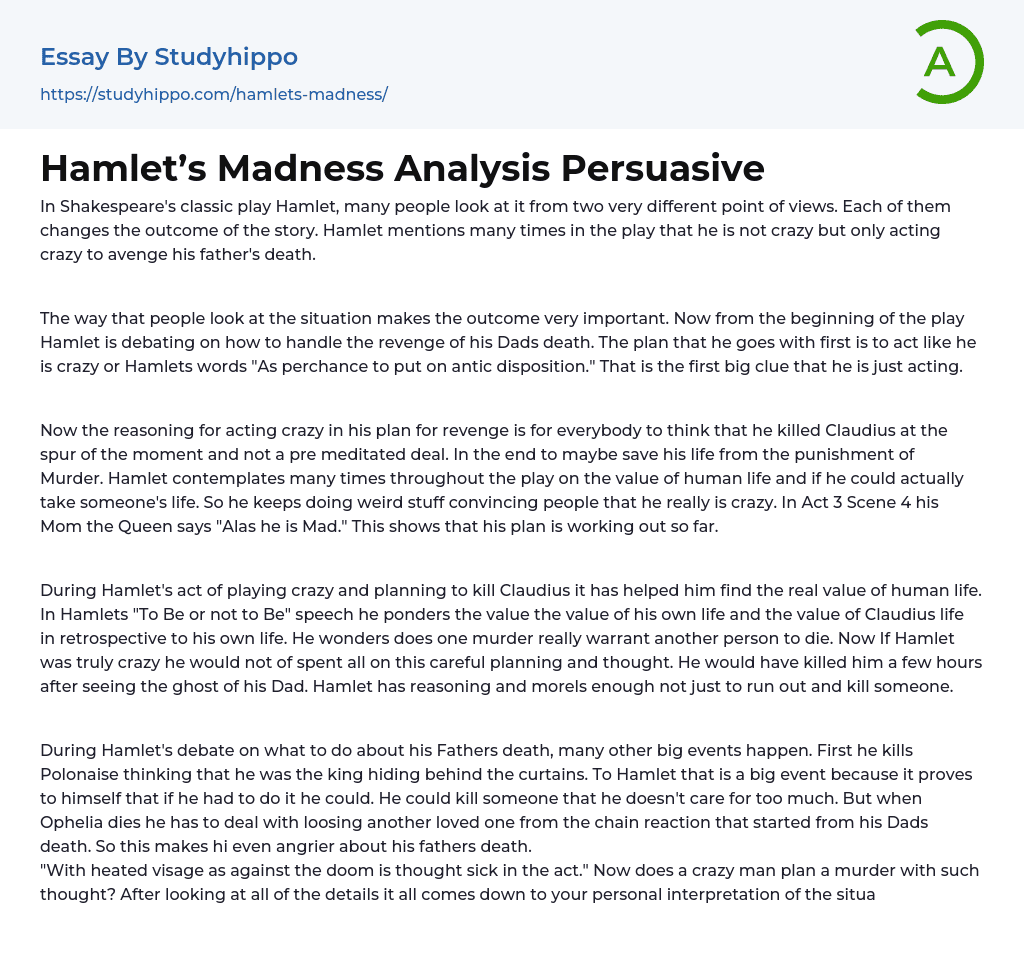From two distinct perspectives, Shakespeare's renowned play Hamlet is scrutinized, each exerting an influence on the narrative's culmination. Throughout the course of the play, Hamlet repeatedly asserts that his mental state is not deranged but merely feigned, as a means to seek retribution for his father's demise.
The way in which people perceive the situation greatly impacts its significance. Right from the start of the play, Hamlet wrestles with how to seek vengeance for his father's death. His initial strategy involves feigning madness, or as Hamlet puts it, "As perchance to put on antic disposition." This is the first clear indication that he is merely acting.
The purpose of acting irrationally in his revenge plan is for others to believe that Hamlet killed Claudius on impulse rather than having planned it in advance,
...potentially saving himself from punishment for murder. Throughout the play, Hamlet reflects on the worth of human life and whether he is capable of taking someone's life. As a result, he continues to behave strangely, convincing others of his insanity. In Act 3 Scene 4, his mother, the Queen, declares, "Alas he is Mad," indicating that his plan is progressing successfully thus far.
During Hamlet's act of playing crazy and planning to kill Claudius, it has helped him realize the true worth of human life. In his "To Be or not to Be" speech, Hamlet contemplates the value of his own life compared to that of Claudius. He questions whether one murder justifies another person's death. If Hamlet were truly insane, he wouldn't have put so much effort into carefully planning and considering his actions. He would have killed Claudius shortly after seeing
the ghost of his father. Hamlet possesses enough reason and morals to refrain from impulsively taking someone's life.
Throughout Hamlet's contemplation of his Father's death, numerous significant events occur. Initially, he mistakenly slays Polonaise, believing him to be the king concealed behind the curtains. This occurrence holds great importance for Hamlet as it demonstrates his capability to take a life and proves that he is willing to do so in certain circumstances, even if he does not particularly care for the person. However, when Ophelia also passes away, he must confront the loss of yet another loved one, a consequence resulting from his Father's death. Consequently, this intensifies his anger towards his father's demise.
"With a flushed countenance that reflects his determination, he contemplates the impending doom." Would a deranged individual meticulously plan a murder in such a manner? Upon thoroughly analyzing all the details, one's interpretation of the situations is crucial. Throughout the play, Hamlet repeatedly asserts that he is not insane but merely assuming madness to seek retribution for his father's death.
- Prince Hamlet essays
- Hamlet Madness essays
- A Doll's House essays
- A Midsummer Night's Dream essays
- A raisin in the sun essays
- A Streetcar Named Desire essays
- An Inspector Calls essays
- Death of a salesman essays
- Everyman essays
- Fences essays
- Hamlet essays
- Hedda Gabler essays
- Iago essays
- King Lear essays
- Macbeth essays
- Much ado about nothing essays
- Oedipus Rex essays
- Oedipus The King essays
- Othello essays
- Pygmalion essays
- Romeo And Juliet essays
- Tartuffe essays
- The glass menagerie essays
- The Importance of Being Earnest essays
- The Merchant Of Venice essays
- The Taming of The Shrew essays
- Twelfth Night essays
- Waiting For Godot essays




